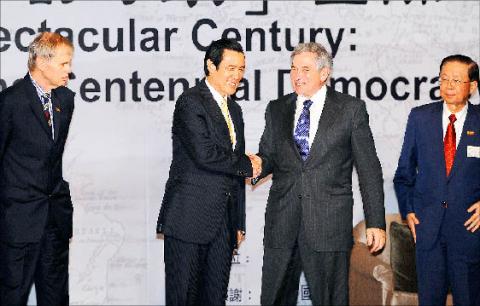Former American Institute in Taiwan (AIT) chairman Richard Bush said in Taipei yesterday that it is important to build a consensus in Taiwan about its core interests so that the country can face the challenges that lie ahead.
The former AIT head, who now serves as the director of the Center for Northeast Asia Policy Studies at the Brookings Institution, made the remark at an international conference titled “A Spectacular Century: The Republic of China (ROC) Centennial Democracy Forums.”
The two-day conference was organized by the Council for Cultural Affairs as part of a year-long celebration of the country’s 100th anniversary.

Photo: Liu Hsin-de, Taipei Times
Speaking on his essay “The Republic of China in Historical Perspective,” he said that Taiwan’s status is appropriate for modern governance, but “we may also ask about its capacity.”
“Does Taiwan have a proper evaluation of the coercive threat posed by the People’s Liberation Army [PLA] that is seriously expanding its war-fighting capabilities?” he asked. “Does Taiwan’s defense establishment, which properly shifted its mission from offense to defense decades ago, need to find ways to strengthen deterrence?”
He said that Taiwan faces tough decisions, such as how to achieve the goals of prosperity, social welfare and security simultaneously.
The toughest challenge of all, he said, is how to cope with a China that seeks to complete its mission of unification.
A local professor asked Bush how he thought Taiwan should deal with China’s unification mission.
Bush replied that he is working on a new book about the relationship between Taipei and Beijing and does not wish to give away the conclusion of his book. However, he did divulge one piece of advice: “I would say it is important to build a consensus on the island about what is truly important for the future of the people on this island.”
He asked participants to think about “what are the things that Taiwan can defend at all costs.” He said without consensus between opinions from both the green and blue spectrum, it is much harder to face that challenge.
Bush also clarified his two-China statement made at a conference in Washington last month.
“There is a huge misunderstanding,” he said. “I in no way advocated the two-China formula as the basis for resolving the disputes between the two sides.”
He said his statement was created by imaginative reporters and the two Chinas he was referring to was the thinking that US officials have accepted over the last 60 years in addressing the challenge of keeping the ROC in the UN.
Former World Bank chairman Paul Wolfowitz also gave a speech at the conference, in which he said that Taiwan is a model of democracy for China and that its economy and politics have had effects on China’s development.
The conference was also attended by Tien Hung-mao (田弘茂), president of the Institute for National Policy Research, and a number of foreign academics including Roderick MacFarquhar of Harvard University, Thomas Gold of California University of Berkeley, and Diana Lary from Canada’s University of British Columbia.

Taiwan is stepping up plans to create self-sufficient supply chains for combat drones and increase foreign orders from the US to counter China’s numerical superiority, a defense official said on Saturday. Commenting on condition of anonymity, the official said the nation’s armed forces are in agreement with US Admiral Samuel Paparo’s assessment that Taiwan’s military must be prepared to turn the nation’s waters into a “hellscape” for the Chinese People’s Liberation Army (PLA). Paparo, the commander of the US Indo-Pacific Command, reiterated the concept during a Congressional hearing in Washington on Wednesday. He first coined the term in a security conference last

Prosecutors today declined to say who was questioned regarding alleged forgery on petitions to recall Democratic Progressive Party (DPP) legislators, after Chinese-language media earlier reported that members of the Chinese Nationalist Party (KMT) Youth League were brought in for questioning. The Ministry of Justice Investigation Bureau confirmed that two people had been questioned, but did not disclose any further information about the ongoing investigation. KMT Youth League members Lee Hsiao-liang (李孝亮) and Liu Szu-yin (劉思吟) — who are leading the effort to recall DPP caucus chief executive Rosalia Wu (吳思瑤) and Legislator Wu Pei-yi (吳沛憶) — both posted on Facebook saying: “I

The Ministry of Economic Affairs has fined Taobao NT$1.2 million (US$36,912) for advertisements that exceed its approved business scope, requiring the Chinese e-commerce platform to make corrections in the first half of this year or its license may be revoked. Lawmakers have called for stricter enforcement of Chinese e-commerce platforms and measures to prevent China from laundering its goods through Taiwan in response to US President Donald Trump’s heavy tariffs on China. The Legislative Yuan’s Finance Committee met today to discuss policies to prevent China from dumping goods in Taiwan, inviting government agencies to report. Democratic Progressive Party Legislator Kuo Kuo-wen (郭國文) said

The Ministry of Economic Affairs has fined Taobao NT$1.2 million (US$36,900) for advertisements that exceeded its approved business scope and ordered the Chinese e-commerce platform to make corrections in the first half of this year or its license would be revoked. Lawmakers have called for stricter supervision of Chinese e-commerce platforms and more stringent measures to prevent China from laundering its goods through Taiwan as US President Donald Trump’s administration cracks down on origin laundering. The legislature’s Finance Committee yesterday met to discuss policies to prevent China from dumping goods in Taiwan, inviting government agencies to report on the matter. Democratic Progressive Party